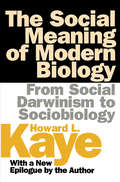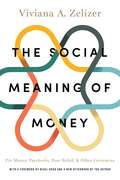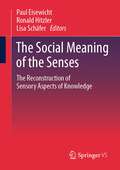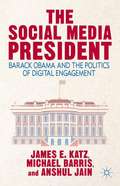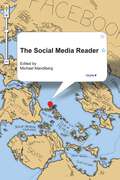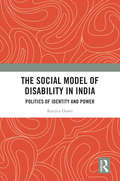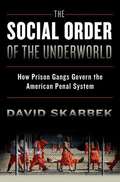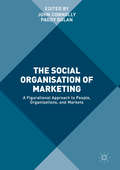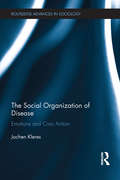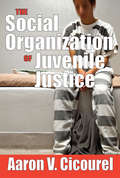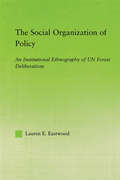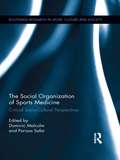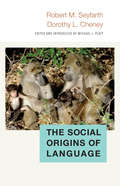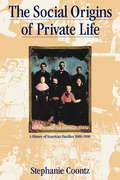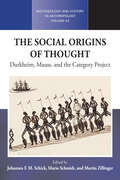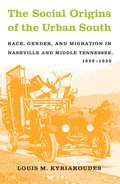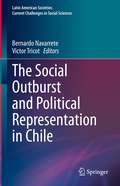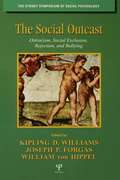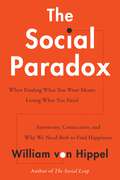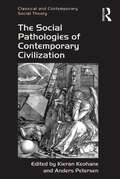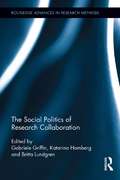- Table View
- List View
The Social Meaning of Modern Biology: From Social Darwinism to Sociobiology
by Howard KayeThe Social Meaning of Modern Biology analyzes the cultural significance of recurring attempts since the time of Darwin to extract social and moral guidance from the teachings of modern biology. Such efforts are often dismissed as ideological defenses of the social status quo, of the sort wrongly associated with nineteenth-century social Darwinism. Howard Kaye argues they are more properly viewed as culturally radical attempts to redefine who we are by nature and thus rethink how we should live. Despite the scientific and philosophical weaknesses of arguments that "biology is destiny," and their dehumanizing potential, in recent years they have proven to be powerfully attractive. They will continue to be so in an age enthralled by genetic explanations of human experience and excited by the prospect of its biological control.In the ten years since the original edition of The Social Meaning of Modern Biology was published, changes in both science and society have altered the terms of debate over the nature of man and human culture. Kaye's epilogue thoroughly examines these changes. He discusses the remarkable growth of ethology and sociobiology in their study of animal and human behavior and the stunning progress achieved in neuropsychology and behavioral genetics. These developments may appear to bring us closer to long-sought explanations of our physical, mental, and behavioral "machinery." Yet, as Kaye demonstrates, attempts to use such explanations to unify the natural and social sciences are mired in self-contradictory accounts of human freedom and moral choice. The Social Meaning of Modern Biology remains a significant study in the field of sociobiology and is essential reading for sociologists, biologists, behavioral geneticists, and psychologists.
The Social Meaning of Money: Pin Money, Paychecks, Poor Relief, and Other Currencies
by Viviana A. ZelizerA dollar is a dollar—or so most of us believe. Indeed, it is part of the ideology of our time that money is a single, impersonal instrument that impoverishes social life by reducing relations to cold, hard cash. After all, it's just money. Or is it? Distinguished social scientist and prize-winning author Viviana Zelizer argues against this conventional wisdom. She shows how people have invented their own forms of currency, earmarking money in ways that baffle market theorists, incorporating funds into webs of friendship and family relations, and otherwise varying the process by which spending and saving takes place. Zelizer concentrates on domestic transactions, bestowals of gifts and charitable donations in order to show how individuals, families, governments, and businesses have all prescribed social meaning to money in ways previously unimagined.
The Social Meaning of the Senses: The Reconstruction of Sensory Aspects of Knowledge
by Ronald Hitzler Lisa Schäfer Paul EisewichtThat which we consider to be real we call knowledge. As a rule, we consider what our five senses convey to us to be real. Our perception and what we consider real and construct as socially effective differs depending on which senses we focus on and how intensively. The connection between reality constructions and sensory conditions has received little attention in social research so far. This concerns, for example, the use of our sensory organs for empirical reconstructions of bodies of knowledge, sensory perceptions as part of bodies of knowledge, or the question of how far knowledge is dependent on sensory abilities. This anthology attempts to close this gap by focusing on the social significance of sensory perceptions and discussing it using the example of various objects of investigation. This book is a translation of an original German edition. The translation was done with the help of artificial intelligence (machine translation by the service DeepL.com). A subsequent human revision was done primarily in terms of content, so that the book will read stylistically differently from a conventional translation.
The Social Media President
by James E. Katz Michael Barris Anshul JainThe proliferation of social media has altered the way that people interact with each other - leveling the channels of communication to allow an individual to be "friends" with a sitting president. In a world where a citizen can message Barack Obama directly, this book addresses the new channels of communication in politics, and what they offer.
The Social Media Reader
by Michael MandibergThe first collection to address the collective transformation happening in response to the rise of social mediaWith the rise of web 2.0 and social media platforms taking over vast tracts of territory on the internet, the media landscape has shifted drastically in the past 20 years, transforming previously stable relationships between media creators and consumers. The Social Media Reader is the first collection to address the collective transformation with pieces on social media, peer production, copyright politics, and other aspects of contemporary internet culture from all the major thinkers in the field.Culling a broad range and incorporating different styles of scholarship from foundational pieces and published articles to unpublished pieces, journalistic accounts, personal narratives from blogs, and whitepapers, The Social Media Reader promises to be an essential text, with contributions from Lawrence Lessig, Henry Jenkins, Clay Shirky, Tim O'Reilly, Chris Anderson, Yochai Benkler, danah boyd, and Fred von Loehmann, to name a few. It covers a wide-ranging topical terrain, much like the internet itself, with particular emphasis on collaboration and sharing, the politics of social media and social networking, Free Culture and copyright politics, and labor and ownership. Theorizing new models of collaboration, identity, commerce, copyright, ownership, and labor, these essays outline possibilities for cultural democracy that arise when the formerly passive audience becomes active cultural creators, while warning of the dystopian potential of new forms of surveillance and control.
The Social Metabolism: A Socio-Ecological Theory of Historical Change (Environmental History #14)
by Víctor M. Toledo Manuel González de MolinaThis book helps readers to understand the fast growing and timely concept of social metabolism. The authors shed a light on the different existing terms and methodologies that have been developed over the years. Through the study of history, readers will get an understanding of the main currents or schools that exist around this concept and their main findings. Also provides examples of how to apply the metabolic approach at different territorial and temporal scales and using different methodological tools. The book presents a novel socio-metabolic theory of historical change, in which biophysical and social variables are combined in an integrated way to understand the dynamics of socio-metabolic transitions.In this second edition, the authors provide valuable updates and new sections to each of the previous chapters. New insights on global phenomena like climate change and the environmental crisis are also considered. As readers will learn, a paradigm shift in almost all areas of research and society will be needed to face the challenges created by the modern industrial society. The authors use a look back in history, to explore the relationship between humans and nature from an evolutionary and thermodynamic perspective. With this approach, readers from history, environmental sciences and social sciences will get valuable insights on possible solutions.
The Social Model of Disability in India: Politics of Identity and Power
by Ranjita DawnThis book presents various paradigms and debates on the diverse issues concerning disability in India from a sociological perspective. It studies disability in the context of its relationship with concepts such as culture/religion, media, literature, and gender to address the inherent failures in challenging prevalent stereotypical and oppressive ideologies. It traces the theological history of disability and studies the present-day universalized social notions of disablement. The volume challenges the predominant perception of disability being only a medical or biological concern and provides deeper insight into the impact of representation through an analysis of the discourse and criteria for ‘normalcy’ in films from the nineteenth and twentieth centuries. It analyzes the formation of perspectives through a study of representation of disability in print media, especially children’s literature, comics, and graphic novels. The author also discusses the policies and provisions available in India for students with disabilities, especially women who have to also contend with gender inequality and gender-based discrimination. The book will be of interest to scholars and researchers of disability studies, educational psychology, special education, sociology, gender studies, politics of education, and media ecology. It will also be useful for educationalists, NGOs, special educators, disability specialists, media and communication professionals, and counsellors.
The Social Order of the Underworld: How Prison Gangs Govern the American Penal System
by David SkarbekWhen most people think of prison gangs, they think of chaotic bands of violent, racist thugs. Few people think of gangs as sophisticated organizations (often with elaborate written constitutions) that regulate the prison black market, adjudicate conflicts, and strategically balance the competing demands of inmates, gang members, and correctional officers. Yet as David Skarbek argues, gangs form to create order among outlaws, producing alternative governance institutions to facilitate illegal activity. He uses economics to explore the secret world of the convict culture, inmate hierarchy, and prison gang politics, and to explain why prison gangs form, how formal institutions affect them, and why they have a powerful influence over crime even beyond prison walls. The ramifications of his findings extend far beyond the seemingly irrational and often tragic society of captives. They also illuminate how social and political order can emerge in conditions where the traditional institutions of governance do not exist.
The Social Organisation of Marketing
by John Connolly Paddy DolanThe book examines the social processes which have shaped the development and organisation of various marketing practices and activities, and the markets associated with them. Drawing on the figurational-sociological approach associated with Norbert Elias the contributors explain how various markets and related marketing practices and activities are organised, enabled and constrained by the actions of people at different levels of social integration. Collectively, The Social Organisation of Marketing provides insights into topics such as the consumption and of wine in China, the advertising of Guinness, the management of on-line communities in Germany, the corporate social responsibility strategies of multinational energy corporations in Africa, the concept of talent management in contemporary organisations, the child consumer in Ireland, and the constraining and enabling influences of the American corporate organisational structure.
The Social Organization of Best Practice: An Institutional Ethnography of Physicians’ Work
by Fiona WebsterThis book explores how best practice for acute stroke care was developed, translated and taken up in medical practice across various sites in the province of Ontario using institutional ethnographic research. Institutional ethnography, an approach developed by Dorothy E. Smith, builds on Smith’s understanding of the social organization of knowledge, allowing for an examination of the complex social relations organizing people’s experiences of their everyday working lives. This work thereby makes visible some of the assumptions and hidden priorities underlying the emphasis given to translating scientific knowledge into medical practice. In this study, the discourses of both evidence-based medicine and knowledge translation, purportedly designed to improve patient care, come into view as managerial tools that directed healthcare resources toward academic hospitals rather than community sites where the majority of patients receive care. These models institutionalize inequities in access to care while claiming to resolve them.
The Social Organization of Disease: Emotions and Civic Action (Routledge Advances in Sociology)
by Jochen KleresEmpirically, this book is a case-study analysis of dissolution processes in German AIDS organizations. Indeed, why is it that civic organizers start out with a commitment to a cause but end up dissolving their organization? This question is exactly what Kleres seeks to tackle within The Social Organization of Disease. Focusing on the emotional bases of dissolved German AIDS organizations to develop a typology of civic action and organizing, Kleres presents a perspective on non-profit organizations that analyses organizational development through the emotional sense making of individual organizers, within the light of larger political processes and cultural contexts. To this end, this volume develops and applies a new methodology for researching emotions empirically, expanding the scope of narrative analysis. However, parallel to this, The Social Organization of Disease also explores how shifting discursive processes establish emotional climates and thus impact on state policies and the evolution of AIDS organizing. The book would appeal to sociologists and political scientists working in the field of social movements and non-profit organisations: but it would also appeal to those who are interested in the sociology of emotions. It would potentially be of interest to non-profit scholars who consider community-based organizations, volunteerism and advocacy, and secondarily, to medical sociologists interested in AIDS service organizations. Sociology, International relations, Social Work, Political Science. May be of interest for NGO-activists and/or employees and leadership.
The Social Organization of Juvenile Justice
by Aaron CicourelThe Social Organization of Juvenile Justice recasts familiar sociological problems of research within a dramatically new and different theoretical and methodological perspective. In seeing law enforcement officers, no less than those accuse of criminal behavior, as locked into the creation of history, or more precisely, a series of retrospective and prospective interpretations of events both within and disengaged from, the social contexts relevant to what purportedly took place, Aaron Cicourel redefined the fault lines of contemporary criminology.The work makes imaginative use of a wide variety of new techniques of analysis from ethnomethodology to community studies—while at no point ignoring basic hard statistical data—in this study of juvenile justice in two California cities. Cicourel states the purpose of his book with clarity: The decision-making activities that produce the social problem called delinquency (and the socially organized procedures that provide for judicial outcomes) are important because they highlight fundamental processes of how social order is possible.This work challenges the conventional view that assumes delinquents are natural social types distributed in some ordered fashion, and produced by a set of abstract internal or external pressures from the social structure. Cicourel views the everyday organizational workings of the police, probation departments, courts, and schools, demonstrating how these agencies contribute to various kinds of transformations of the original events that led to law enforcement contact.This contextual creation of facts in turn leads to improvised, ad hoc interpretations of character structure, family life, and future prospects. In this way, the agencies may generate delinquency by their routine encounters with the young. His new introduction discusses with great detail the methodology behind his research and responses to earlier critiques of his work.
The Social Organization of Policy: An Institutional Ethnography of UN Forest Deliberations (New Approaches in Sociology)
by Lauren E. EastwoodThis book provides a specific case study--based upon direct research with UN processes--which enables the reader to situate larger theoretical arguments regarding civil society, globalization, and sustainable development within the context of the actual activities of practitioners working within the UN forest policy-making arena.
The Social Organization of Sports Medicine: Critical Socio-Cultural Perspectives (Routledge Research in Sport, Culture and Society)
by Parissa SafaiThe Social Organization of Sports Medicine is the first book-length overview of the social scientific study of sports medicine, drawing together work from an international cadre of scholars who examine and provide interdisciplinary analysis of the dynamic and multi-faceted relationships between sports and medicine and within sports medicine. The book charts changing perceptions of sport within medical discourse, attempts by sports medicine providers to forge professional identities in response to these processes, the day-to-day experiences of deliverers of sports medicine and the reactions of recipients of that healthcare. The contents are organized in four sections, examining the competing and changing ways in which sports medicine is conceived, the ways in which it is organized, the ways in which it is practiced, and points of contestation between traditional and alternative and emerging forms of (sports) medicine. This collection of essays consolidates recent advances in this area of study and establishes a basis for the future development of the field.
The Social Organization: Developing Employee Connections and Relationships for Improved Business Performance
by Dave Ulrich Jon InghamFull of practical advice for HR and other business professionals, The Social Organization is a clear guide to addressing the urgent need for companies to shift their focus from developing individuals to enabling networks and relationships between employees. Case studies from leading companies such as Whole Foods, P&G, The Cleveland Clinic, Spotify and Cisco illustrate how relationship-based strategies can be implemented successfully to increase organizational performance.Following a foreword by Dave Ulrich, Part One of The Social Organization explores the context of social capital and analyses how and why HR and others responsible for talent management need to foster and develop social capabilities. Part Two provides practical guidance for developing higher quality connections and social capital by improving the alignment and effectiveness of organizational architectures, including through workplace design. Part Three outlines how HR and related professionals can identify and implement appropriate changes throughout the whole employee life cycle: this includes initial recruitment and job design, social learning, performance management, employee retention, talent management, organization development and the role of social media and other technology as well as social analytics. The Social Organization is an essential book for all professionals needing to develop the social capital of their organizations for improved performance.
The Social Origins of Human Rights
by Luis Van IsschotHuman rights activism is often associated with international organizations that try to affect the behavior of abusive states around the globe. In Barrancabermeja, Colombia, argues Luis van Isschot in "The Social Origin of Human Rights," the struggle for rights has emerged more organically and locally, out of a long history of civil and social organizing. He offers deep insight into the lives of home-grown activists in a conflict zone, against the backdrop of major historical changes that shaped Latin America in the twentieth century. Built by Standard Oil in 1919, and home to the largest petroleum refinery in the country, Barrancabermeja has long been a critical battleground in Colombia s armed conflict. One of the most militarized urban areas on earth, the city has been a regional base for the Colombian armed forces as well as for leftist guerrillas and a national paramilitary movement. In the midst of a dirty war in which the majority of victims were civilians, urban and rural social movements from Barrancabermeja and the surrounding area came together to establish a human rights movement. These frontline activists called upon the Colombian state to protect basic human rights and denounced the deeper socioeconomic inequalities they saw as sources of conflict. Through close study of the complex dynamics at work in Barrancabermeja, van Isschot shows how the efforts we describe as human rights activism derive in large part from these lived experiences of authoritarianism, war, poverty, and social exclusion. Through its social and historical approach, his analysis both complements and challenges the work of scholars who look at rights issues primarily through a legal lens. "
The Social Origins of Language
by Robert M. Seyfarth Dorothy L. Cheney Michael L. PlattHow human language evolved from the need for social communicationThe origins of human language remain hotly debated. Despite growing appreciation of cognitive and neural continuity between humans and other animals, an evolutionary account of human language—in its modern form—remains as elusive as ever. The Social Origins of Language provides a novel perspective on this question and charts a new path toward its resolution.In the lead essay, Robert Seyfarth and Dorothy Cheney draw on their decades-long pioneering research on monkeys and baboons in the wild to show how primates use vocalizations to modulate social dynamics. They argue that key elements of human language emerged from the need to decipher and encode complex social interactions. In other words, social communication is the biological foundation upon which evolution built more complex language.Seyfarth and Cheney’s argument serves as a jumping-off point for responses by John McWhorter, Ljiljana Progovac, Jennifer E. Arnold, Benjamin Wilson, Christopher I. Petkov and Peter Godfrey-Smith, each of whom draw on their respective expertise in linguistics, neuroscience, philosophy, and psychology. Michael Platt provides an introduction, Seyfarth and Cheney a concluding essay. Ultimately, The Social Origins of Language offers thought-provoking viewpoints on how human language evolved.
The Social Origins of Private Life: A History of American Families 1600-1900
by Stephanie CoontzCurrent debates about the future of the family are often based on serious misconceptions about its past. Arguing that there is no biologically mandated or universally functional family form, Stephanie Coontz traces the complexity and variety of family arrangements in American history, from Native American kin groups to the emergence of the dominant middle-class family ideal in the 1890s. Surveying and synthesizing a vast range of previous scholarship, as well as engaging more particular studies of family life from the seventeenth to the nineteenth centuries, Coontz offers a highly original account of the shifting structure and function of American families. Her account challenges standard interpretations of the early hegemony of middle-class privacy and "affective individualism," pointing to the rich tradition of alternative family behaviors among various ethnic and socioeconomic groups in America, and arguing that even middle-class families went through several transformations in the course of the nineteenth centure. The present dominant family form, grounded in close interpersonal relations and premised on domestic consumption of mass-produced household goods has arisen, Coontz argues, from a long and complex series of changing political and economic conjunctures, as well as from the destruction or incorporation of several alternative family systems. A clear conception of American capitalism's combined and uneven development is therefore essential if we are to understand the history of the family as a key social and economic unit. Lucid and detailed, The Social Origins of Private Life is likely to become the standard history of its subject.
The Social Origins of Thought: Durkheim, Mauss, and the Category Project (Methodology & History in Anthropology #43)
by Johannes F. M. Schick, Mario Schmidt, and Martin ZillingerBy studying how different societies understand categories such as time and causality, the Durkheimians decentered Western epistemology. With contributions from philosophy, sociology, anthropology, media studies, and sinology, this volume illustrates the interdisciplinarity and intellectual rigor of the “category project” which did not only stir controversies among contemporary scholars but paved the way for other theories exploring how the thoughts of individuals are prefigured by society and vice versa.
The Social Origins of the Urban South
by Louis M. KyriakoudesIn the late nineteenth and early twentieth centuries, millions of black and white southerners left farms and rural towns to try their fate in the region's cities. This transition brought about significant economic, social, and cultural changes in both urban centers and the countryside. Focusing on Nashville and its Middle Tennessee hinterland, Louis Kyriakoudes explores the impetus for this migration and illuminates its effects on regional development.Kyriakoudes argues that increased rural-to-urban migration in the late nineteenth century grew out of older seasonal and circular migration patterns long employed by southern farm families. These mobility patterns grew more urban-oriented and more permanent as rural blacks and whites turned increasingly to urban migration in order to cope with rapid economic and social change.The urban economy was particularly welcoming to women, offering freedom from the male authority that dominated rural life. African Americans did not find the same freedoms, however, as whites found ways to harness the forces of modernization to deny them access to economic and social opportunity. By linking urbanization, economic and social change, and popular cultural institutions, Kyriakoudes lends insight into the development of an urban, white, working-class identity that reinforced racial divisions and laid the demographic and social foundations for today's modern, urban South.
The Social Outburst and Political Representation in Chile (Latin American Societies)
by Bernardo Navarrete Victor TricotThis is the first book in English to present a comprehensive analysis of the October 2019 social outbreak in Chile and its consequences for the country’s political system. For almost 30 years (1990-2019), Chile was recognized as a model of political and economic stability in Latin America, but the 2019 protests put into question the whole structure of representation based on programmatic political parties. This contributed volume analyzes the causes of the social outbreak by examining the interaction between political parties and social movements in Chile since 2000, establishing bridges between the sociology of social movements and the political science of parties and forms of traditional political representation. The book is organized in three parts. The first part analyzes the collapse of the political party system in Chile. The second part shows how social movements introduced innovative forms of political mobilization that challenged the traditional forms of political representation. Finally, the third part presents case studies focusing on specific social movements and their contributions to the renewal of political representation in Chile. The Social Outburst and Political Representation in Chile will be a valuable resource for sociologists, political scientists and other social scientists interested in understanding the challenges posed to political parties and institutions by social movements formed by citizens who no longer see themselves represented by the traditional forms political participation.
The Social Outcast: Ostracism, Social Exclusion, Rejection, and Bullying (Sydney Symposium of Social Psychology #Vol. 7)
by Kipling D. Williams William Von Hippel Joseph P. ForgasThis book focuses on the ubiquitous and powerful effects of ostracism, social exclusion, rejection, and bullying. Human beings are an intrinsically gregarious species. Most of our evolutionary success is no doubt due to our highly developed ability to cooperate and interact with each other. It is thus not surprising that instances of interpersonal rejection and social exclusion would have an enormously detrimental impact on the individual. Until 10 years ago, however, social psychology regarded ostracism, rejection and social exclusion as merely outcomes to be avoided, but we knew very little about their antecedents and consequences, and about the processes involved when they occurred. Furthermore, the literatures of ostracism, social exclusion and rejection have not until now included discussions of the bullying literature.
The Social Paradox: Autonomy, Connection, and Why We Need Both to Find Happiness
by William von HippelA Next Big Idea Club Must Read of February 2025From the author of The Social Leap comes this thought-provoking exploration into humans’ two core evolutionary needs, for connection and autonomy, how the modern world has thrown them out of whack, and how we can rebalance them to improve our lives.Why do people who have so much—leading comfortable lives filled with unprecedented freedom, choice, and abundance—often feel so unhappy and unfulfilled? This phenomenon is a defining paradox of our time and one we endlessly seek to solve. In The Social Paradox, psychologist William von Hippel argues that we need to think about this problem in a new way. By changing our perspective, we might finally see the solution, bringing us greater happiness and more satisfying relationships.The key is to understand the interplay between our two most basic psychological needs—for connection and autonomy. Evolution made us dependent on one another for survival, instilling in us a strong need to connect. It also made us seek autonomy, so our ancestors could distinguish themselves within their groups, improving their chances to procreate and gain status.These two opposing needs are our most fundamental psychological drivers, and while our lives once ensured a happy balance between them, the opportunities of today’s world have thrown it out of whack. As von Hippel explains, our modern world no longer demands connection but it provides endless opportunity for autonomy; this lopsidedness lies at the root of many of our most intractable problems. Recognizing this imbalance and working to counter it can drastically change how we make decisions, spend our time, and find happiness.The Social Paradox invites us to examine the fundamental building blocks of life and society—politics, religion, urban living, marriage—in a brand-new way. Once we understand the evolutionary forces driving us, we can begin to see how to counteract the emptiness and loneliness of contemporary life.
The Social Pathologies of Contemporary Civilization: Anxiety, Depression And Alzheimer's Disease (Classical And Contemporary Social Theory Ser.)
by Kieran KeohaneThe Social Pathologies of Contemporary Civilization explores the nature of contemporary malaises, diseases, illnesses and psychosomatic syndromes, examining the manner in which they are related to cultural pathologies of the social body. Multi-disciplinary in approach, the book is concerned with questions of how these conditions are not only manifest at the level of individual patients' bodies, but also how the social 'bodies politic' are related to the hegemony of reductive biomedical and individual-psychologistic perspectives. Rejecting a reductive, biomedical and individualistic diagnosis of contemporary problems of health and well-being, The Social Pathologies of Contemporary Civilization contends that many such problems are to be understood in the light of radical changes in social structures and institutions, extending to deep crises in our civilization as a whole. Rather than considering such conditions in isolation - both from one another and from broader contexts - this book argues that health and well-being are not just located at the level of the individual body, the integral human person, or even collective social bodies; rather, they encompass the health of humanity as a whole and our relationship with Nature. A ground-breaking analysis of social malaise and the health of civilization, this book will be of interest to scholars of sociology, social theory, social psychology, philosophy and anthropology.
The Social Politics of Research Collaboration (Routledge Advances in Research Methods #8)
by Gabriele Griffin Katarina Hamberg Britta LundgrenThe past two decades have seen an increasing emphasis on large and interdisciplinary research configurations such as research networks, and centers of excellence including those in Social Sciences and Humanities research. Little research has been undertaken, however, to understand how these new large research structures that are being called forth by research funders and research/higher education institutions alike function socially, and what the impact of operating within such structures is on those working within, and those working with, them. Past writers have discussed the "intra-agentic" operations of human researchers and the material laboratory environment in its broadest sense. This volume is concerned with the social politics of research collaboration in relation to six key positions: leaders of large research formations, leaders of sub-projects within large collaborations, participant researchers, junior and early career researchers, advisory board members, and those who look in from the outside such as researchers who are un-funded. It explores the mostly unacknowledged but critical aspect of social structures in research, discussing issues such as struggles over leadership styles, the marginalization of researchers working cross-disciplinarily, power hierarchies and intellectual ownership, and the silencing of dissent in research.
